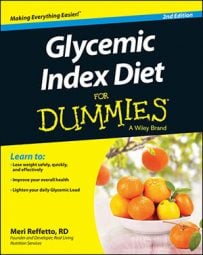What you eat can certainly impact how well you feel during your exercise routine. It can also determine whether you're getting the most out of your workout. Eating a nutritionally balanced low-glycemic diet gives you a great foundation for adequately fueling your exercise routine.
However, if you prefer a little more direction, follow these tips to improve your workout:
Consume an adequate amount of carbohydrates. When you exercise, your muscles burn a type of carbohydrate called glycogen for fuel. You can't produce optimal glycogen stores with a high-protein, low-carbohydrate diet.
To keep your body's fuel stores primed for peak performance, you need to eat a diet that's rich in low-glycemic carbohydrates, such as fruits and vegetables. I also recommend going for the low-glycemic whole grains — brown rice, quinoa, pearl barley, and 100-percent whole-grain bread.
Eat your protein. Active people need more protein than people who live a sedentary lifestyle largely because protein assists in muscle building and tissue repair. Include lean meats, fish, soy, and eggs in your diet regularly and make sure your post-workout meal contains a significant protein source.
Load up on fruits and veggies. There's just no mistaking how important fruits and vegetables are to your health. When you exercise, you breathe harder and take in more oxygen. Even though you need oxygen to support life, it can become unstable in the body and damage your muscle cells, leading to inflammation and soreness.
You can protect yourself from oxidation by eating healthful amounts of the antioxidants found in fruits and vegetables. Be sure to eat at least five servings of low-glycemic fruits and vegetables a day.
Drink, drink, drink. The more you exercise, the more you sweat. Replacing your body's lost fluid is vital for peak performance and endurance (you'll definitely feel fatigued if you don't drink enough water). Always keep a bottle of water on hand during long workouts. Also, try to drink at least eight 8-ounce servings of water per day to help keep your body hydrated.
Fuel up before a workout. Eating something before you work out not only lengthens your workout but also increases your endurance. If you don't eat before you exercise, you can wind up feeling light-headed; you may even experience fatigue and nausea.
In addition, not eating before a workout means your body must turn to muscle protein for fuel because it doesn't have enough carbohydrates. By starting your workout well fueled, your body will burn a combination of the carbohydrates stored in your muscles and stored fat.
Try to eat a meal or snack that features low-glycemic carbohydrates, is low in fat, and contains a moderate amount of protein two to four hours before a workout or event in order to keep your system well fueled.
If you prefer to work out as soon as you wake up in the morning, this can be difficult. Try to have a small piece of fruit and a glass of water, but only if that doesn't make your stomach feel upset when you start your workout.
Fuel up after a workout. To ensure optimal recovery of your muscles, you need to consume calories and fluids within the first 30 minutes after you exercise. Doing so allows you to rebuild your glycogen stores so they're ready to go the next day.
If you aren't hungry right after a workout, a quick snack that includes carbohydrates and protein will do. Don't forget to eat a protein-containing meal later on to help repair the muscle damage caused during your workout.
Although there's some evidence that choosing high-glycemic foods may be a more effective method of replenishing glycogen stores post-workout, this research applies primarily to endurance athletes. The Average Joe or Jane is better off sticking with low-glycemic foods.

